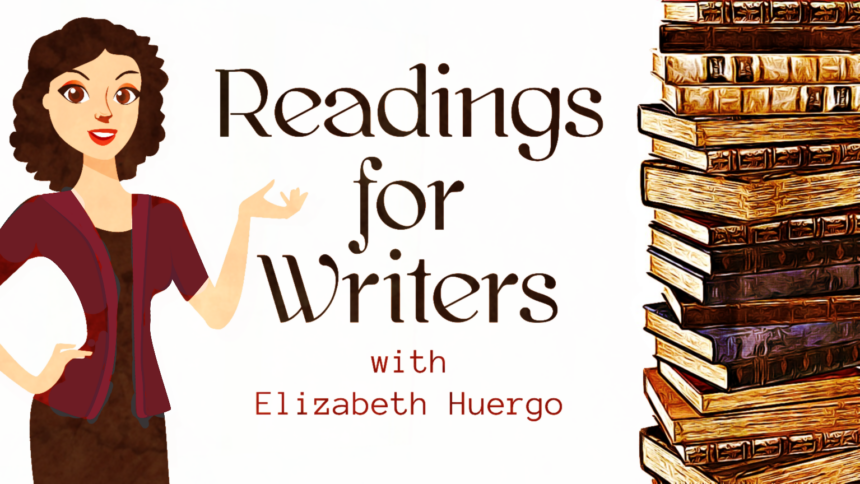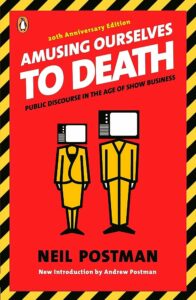Readings for Writers: Unwelcome Prophets and Catchy Hooks
By Elizabeth Huergo | April 30, 2024 |

No prophet is welcome in his own country according to the New Testament. It isn’t so much what they foresee. It’s that their predictions are based on their ability to observe the foibles, biases, and bad practices of the present. Prophets foresee the future much like climate scientists who analyze past and present in order to predict the death of coral reefs and the steady rise of sea levels. We don’t want to hear anything critical about ourselves, and we don’t like inscrutable killjoys, prophets who warn us to temper our appetites, to nurture good habits, and to think of others.
One of my favorite secular prophets, Neil Postman, was a media and social critic at NYU for nearly 40 years. I was watching Jordan Klepper and Ronnie Chieng’s interview of Kyle Chayka, author of Filterworld: How Algorithms Flattened Culture, on The Daily Show when I thought of Postman. The premise of Postman’s book, Amusing Ourselves to Death: Public Discourse in the Age of Show Business, published in 1985, is that electronic media is homogenizing culture.
 I have not read Filterworld yet. According to NPR, Chayka “argues that all this machine-guided curation [created by algorithms] has made us docile consumers and flattened our likes and tastes.” Chayka adds that “the algorithms pressure artists and other content creators to shape their work in ways that fit the feeds.” Algorithms are narrowing the scope of our world and spoon-feeding us our own biases. (In my mind’s eye I see Narcissus, enraptured by his own image, tipping his weight too far over the bank, and falling to his death. Or is the proper analogy to Midas who, in one of many versions of his story, dies of starvation induced by avarice, the food that touches his lips turning to gold?)
I have not read Filterworld yet. According to NPR, Chayka “argues that all this machine-guided curation [created by algorithms] has made us docile consumers and flattened our likes and tastes.” Chayka adds that “the algorithms pressure artists and other content creators to shape their work in ways that fit the feeds.” Algorithms are narrowing the scope of our world and spoon-feeding us our own biases. (In my mind’s eye I see Narcissus, enraptured by his own image, tipping his weight too far over the bank, and falling to his death. Or is the proper analogy to Midas who, in one of many versions of his story, dies of starvation induced by avarice, the food that touches his lips turning to gold?)
The despairing, enraged lamentations of the prophet Jeremiah eventually turned the crowd against him. People just did not want to hear another jeremiad, so they stoned him to death. “Shuffle Off to Bethlehem,” the eighth chapter of Postman’s Amusing Ourselves to Death, has the pacing, the crescendo of a jeremiad, one we no longer have the option of dismissing since it has become our daily experience. Most of the coral is dead now and no longer the color of coral. The city of Miami has installed water pumps along certain streets that flood on a regular basis.
In 1985, when we were all less enraptured, Postman observed that a televangelist would be loath to base a sermon on Christ’s pointed remark to his disciples about materialism and salvation; specifically, that “it is easier for a camel to go through the eye of a needle, than for a rich man to enter into the kingdom of God” (KJ Matthew 19:23-26). Postman quotes the executive director of the National Religious Broadcasters Association, who admits “‘You can get your share of the audience only by offering people something they want.’” The audience is told the moral lesson they want to hear because the televangelist is no longer a shepherd who loves his flock and leads them to safety. Love has shifted and become lucre, which is what the shepherd will see more of if he pleases his audience of followers.
We have gotten to the point, collectively, that we have forgotten that screens are frames and that every frame shapes a particular bias. For Postman, the frame is the television screen. “[W]hat is televised” he explains, “is transformed from what it was to something else…”. To paraphrase Postman, sacred spaces and sacred rituals are transformed, reduced to entertainment, once they are televised through a secular frame. It is a mistake to confuse the experience of one with the experience of the other. Yet that is precisely what we do. We constantly point to the screen (television, desktop computer, laptop, cell phone, smart watch, social media app) as if it were not a framed experience; as if what we are seeing has not already been manipulated, transformed, homogenized into something else.
 Postman distinguishes between “enchantment” and “entertainment,” drawing (I believe) from the original meaning of “enchantment” as a song, thus making the connection to breath, spirit. “By endowing things with magic,” he asserts, “enchantment is the means through which we may gain access to sacredness. Entertainment is the means through which we distance ourselves from it.” A sacred experience is based on mystery. Entertainment is based on what we know. The former opens us up to inquiry while the latter confirms what we already desire, closing us off to further inquiry.
Postman distinguishes between “enchantment” and “entertainment,” drawing (I believe) from the original meaning of “enchantment” as a song, thus making the connection to breath, spirit. “By endowing things with magic,” he asserts, “enchantment is the means through which we may gain access to sacredness. Entertainment is the means through which we distance ourselves from it.” A sacred experience is based on mystery. Entertainment is based on what we know. The former opens us up to inquiry while the latter confirms what we already desire, closing us off to further inquiry.
Mass culture slurps up every bit of information about us not to help us become kinder people who are more attentive to civic obligations but rather to commodify that information and sell it back to us at a price we can almost afford. This is the destructive narcissism of mass culture. This is the harm of untrammeled avarice. Our loss of privacy is collateral damage, the blowback of being offered more and more of precisely what we think we want, reflecting our desired image back to ourselves.
Toward the end of the chapter, Postman quotes Hannah Arendt: “[T]here are many great authors of the past who have survived centuries of oblivion and neglect, but it is still an open question whether they will be able to survive an entertaining version of what they have to say” (qtd in Postman). For both Postman and Arendt, every time mass culture produces a version of an original story that version is made more palatable, its edges softened, homogenized to confound, or offend the fewest number of people for the maximum amount of profit.
You might shrug and quip that “[h]ope springs eternal.” But we need to read past what pleases easily. We have to read what has been unmoored and left to perish outside of the frame. The actual line from Pope’s “Essay on Man” reads:
Hope springs eternal in the human breast;
Man never is, but always to be blest;
The soul uneasy, and confin’d from home,
Rests, and expatiates, in a life to come.
Pope’s mastery of the heroic couplet allows him to convey an argument: Man’s rewards will come in heaven. As for the poor and those unjustly treated, they will have to wait. This is an “essay on man” not an essay on men and women or human beings. Pope is an extraordinary poet. You can’t understand the development of English prosody without him. He is also a misogynist and a racist. Those are unpalatable qualities. Let’s face them squarely, however much they make us squirm. We have to learn to hold the poet’s brilliance and his violence in balance. We can’t understand and refute anything that we frame out of sight. We can’t cancel everything that is unpalatable about the poet. Fearful of a book? Don’t ban it. Read and rebut it accurately, persuasively.
Chayka, in the NPR piece, is quoted as saying that algorithms also affect other artists: “For musicians working through Spotify or TikTok, [the pressure to conform created by algorithms] might mean recording catchy hooks that occur right at the beginning of a song — when a user is most likely to hear it.” And writers? I would argue that agents and publishers have become more intent on stories that sell; and stories that sell are the most easily digestible ones. These are stories with “catchy hooks” that are heavy on plot and lean hard into a visual bias, a point of view more like a movie camera panning predictably from side to side, recording an entertainment, than a narrator unraveling a mystery.
[coffee]









Elizabeth you write: every time mass culture produces a version of an original story that version is made more palatable, its edges softened, homogenized to confound, or offend the fewest number of people for the maximum amount of profit.
Sad, but true. And even sadder when this devolves down to what teachers can teach in secondary level schools in certain states. When I was teaching, our culture faced serious problems that needed to be addressed. Soon after, there was Columbine and school shootings. One positive way to fight the watering down of issues…is to look hard at them, ask the culture to deal with them. We can only do that IF we acknowledge WHERE WE ARE GOING. Certainly, some of the works you reference are not for younger readers. But that doesn’t mean we cannot lure our younger population to read serious works. Discuss serious works. The rage currently happening on our campuses reveals that we still hunger for guidance and truth. Thank for your meaningful post.
Hello Elizabeth. I read Postman’s book thirty years ago, and his title truly captures the essence of his message. It’s all about how we use our discretionary time, the hours that are ours to use as we choose. Both as readers and writers. How many of us look to video more than to the written word in studying story and plot structure? How many WU posts rely on video references to make a point?
Along with many other words of wisdom in your post, Here’s a quote that jumped out:
“For both Postman and Arendt, every time mass culture produces a version of an original story that version is made more palatable, its edges softened, homogenized to confound, or offend the fewest number of people for the maximum amount of profit.”
True then, and depressingly more true now. It’s no longer good enough to widen the publishing tent to include many who were shut out in the past. What’s For Sale must first be sanitized by “sensitivity readers,” and this also goes for classics that need to have what might offend laundered out of them. It’s why a good chunk of my own discretionary time now goes to reading non-fiction, and novels from the twentieth century.
Sacred experience based on mystery versus entertainment based on what we know. Enchantment versus entertainment. Such rich distinctions and such a needed alarm about The Algorithm.
And before that it was video games, TV, comic books, rock’n’roll, jazz music, flapper dresses, dancing, dime novels…there has always been entertainment and while it can make money, it doesn’t last through the ages…or does it?
Some does, and when it does it is because it has a touch of the sacred, tells us not what we want to hear but what we need to hear. It tells us about ourselves.
Book publishing owes a lot of sales today to The Algorithm, but it is not a slave it. There’s plenty of look-alike fiction, for sure, but also plenty of fiction that takes us somewhere new. It’s up to us to write—and read—the stories that do so.
Thanks for a thought-provoking essay. Here’s a couple of examples from other media. Some years back my best childhood friend, a microbiologist, and I visited the new Hall of Science in San Francisco, which had many “fun” interactive displays, causing her to exclaim, “This isn’t science, it’s entertainment!” Another friend, an artist, hearing about the supposedly total-immersion Van Gogh exhibit, in which Van Gogh’s most famous paintings are projected on all the surfaces of the room so the viewers can walk through them more or less as if they were real landscapes, or sit within them listening to a program of presumably complementary music, felt this was a desecration of Van Gogh’s work. She felt strongly that the genius of artists, and the meaning of their work, is truly expressed through the constraints of their media. The argument in favor of these re-framings, I suppose, is that the interactive experience introduces people, especially children, to science and art that they might find too intimidating, or too boring, otherwise — ignoring the astounding fact that previous generations developed their interest in the old-fashioned straightforward way. Today’s children (and many adults) are being taught that science and art ARE intimidating and boring, in need of jazzing up with games and gimmicks.
Beautiful reflections, Elizabeth. This is why we go to the Latin Mass because it’s the Mass of the Ages, and it pulls me out of this world into that of heavenly mysteries. And unsurprisingly, it is filled with young people. Some stories, too, are timeless, transcendent. I’m reading a lovely historical fiction story based on a true person, a midwife: The Frozen River by Ariel Lawhon, and it has some of the most beautiful passages on marriage. Such a delight!
Thanks, Elizabeth, for sharing your thoughts on this important issue. As you state: “Algorithms are narrowing the scope of our world and spoon-feeding us our own biases.” Technological anesthetization definitely has contributed to an erosion of our creative and critical thinking. Commodification culture makes this troubling trend difficult to alter. Reading your piece reminded me of a line from William Carlos Williams’s poem, “Asphodel, That Greeny Flower”:
It is difficult
to get the news from poems
yet men die miserably every day
for lack
of what is found there.
(I’m choosing to believe that Williams is speaking of humanity collectively when he writes “men.”) Honest writing that exposes vulnerabilities is an antidote to the type of algorithmic conditioning commonly used by social media platforms, though in our current cultural climate, not a particularly palatable one.